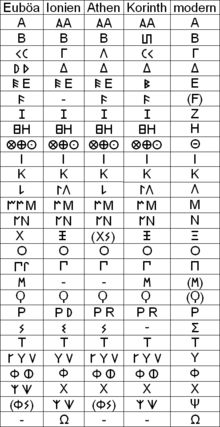Adolf Kirchhoff
Johann Wilhelm Adolf Kirchhoff (born January 6, 1826 in Berlin ; † February 27, 1908 there ) was a German philologist and archaeologist .
Life
Adolf Kirchhoff was the son of the history and portrait painter Johann Jakob Kirchhoff (1796–1848) and his wife Wilhelmine geb. Reuter. His brothers were the booksellers Albrecht (1827–1902) and Otto Kirchhoff (1834–1910).
Adolf Kirchhoff graduated from the Friedrich-Wilhelm-Gymnasium in Berlin. After graduation, he also attended Friedrich-Wilhelms-Universität there in 1842 , where he studied classical philology with Karl Lachmann and August Böckh . After receiving his doctorate in 1846, he became an adjunct, then senior teacher and professor at the Joachimsthalschen Gymnasium in Berlin. In 1860 he was elected a full member of the Royal Prussian Academy of Sciences . In 1865 he followed a call to the chair of Greek philology as successor to Böckh and was appointed full professor. He was also elected as a foreign member of the American Academy of Arts and Sciences in 1888 .
Adolf Kirchhoff died in Berlin in 1908 at the age of 82 and was buried in the Old St. Matthew Cemetery in Schöneberg . The grave has not been preserved.
Services
Kirchhoff has made great contributions to the criticism of Greek writers and to epigraphy . In the field of Homer philology the following should be mentioned:
- Quaestionum Homericarum particula (Berlin 1846)
- The Homeric Odyssey and its Creation (Berlin 1859)
- The composition of the Odyssey , collected essays (Berlin 1869), which he combined and expanded in the 2nd edition to Die Homerische Odyssey (Berlin 1879).
He also published a text edition for Plotinus (Leipzig 1856, 2 vols.), For Euripides a critical edition (Berlin 1855, 2 vols.) And a text edition (Berlin 1867–1868, 3 vols.), For Herodotus On the writing time of the Herodotischen Geschichtswerk (Berlin 1868, 2nd ed. 1878), for Xenophon an edition of the writing De republica Atheniensium (Berlin 1874, 2nd ed. 1881), for Aeschylus a text edition (Berlin 1880).
The first results of his epigraphic studies related to Italy; it appeared:
- The Umbrian language monuments (Berlin 1849-1851, 2 vol.) And
- The town charter of Bantia (Berlin 1853).
Then he published on the Germanic runes:
- The Gothic runic alphabet (Berlin 1852) and
- The Frankish runes (in Moriz Haupt's magazine for German antiquity , 1855).
He also promoted Greek inscription. He edited the 2nd fascicle of the 4th volume for the Corpus inscriptionum graecarum (containing the Christian inscriptions, Berlin 1859) and completed the whole enterprise, on behalf of the Academy he was in charge of the Corpus inscriptionum atticarum , to which he himself wrote the 1st volume (containing the inscriptions before Euclid , Berlin 1873), and wrote: Studies on the history of the Greek alphabet (Berlin 1863, 4th ed. 1887). He was also involved in the editing of Hermes from 1866 to 1881 .
Tables and maps dating back to cemetery

Variants of the ancient archaic Greek alphabets ( Evia- red, Ionian- blue, Athenian- light blue, Corinthian ) compared to the classical form
|
|
literature
- Heinrich Düntzer : Kirchhoff, Köchly and the Odyssey (Cologne 1872)
- Peter Wirth : Kirchhoff, Adolf. In: New German Biography (NDB). Volume 11, Duncker & Humblot, Berlin 1977, ISBN 3-428-00192-3 , p. 647 f. ( Digitized version ).
Web links
- Literature by and about Adolf Kirchhoff in the catalog of the German National Library
Individual evidence
- ^ Hans-Jürgen Mende: Lexicon of Berlin tombs . Haude & Spener, Berlin 2006. p. 304.
| personal data | |
|---|---|
| SURNAME | Kirchhoff, Adolf |
| ALTERNATIVE NAMES | Kirchhoff, Johann Wilhelm Adolf |
| BRIEF DESCRIPTION | German philologist and archaeologist |
| DATE OF BIRTH | January 6, 1826 |
| PLACE OF BIRTH | Berlin |
| DATE OF DEATH | February 27, 1908 |
| Place of death | Berlin |


